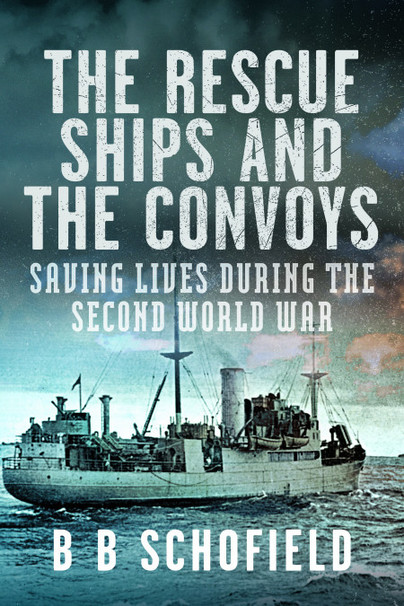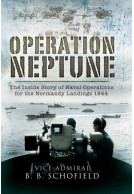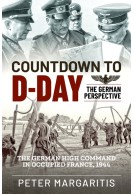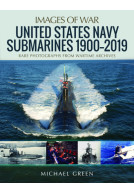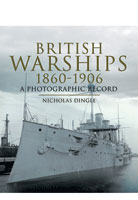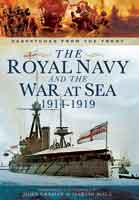The Rescue Ships and The Convoys (Hardback)
Saving Lives During The Second World War
Imprint: Pen & Sword Maritime
Pages: 224
Illustrations: 34 mono illustrations
ISBN: 9781036102661
Published: 16th April 2024
(click here for international delivery rates)
Need a currency converter? Check XE.com for live rates
| Other formats available - Buy the Hardback and get the eBook for £1.99! | Price |
|---|---|
| The Rescue Ships and The Convoys ePub (5.1 MB) Add to Basket | £6.99 |
The Rescue Ships and the Convoys tells the history of one of the least known aspects of Second World War maritime history. Despite the threat of heavy losses of ships and lives, no hospital ships, which had to be lit, could accompany the convoys as they would betray a convoy’s position.
The solution was to create a fleet of 30 small Merchant Navy vessels of about 1,500 gross tons, mostly from coastal trade. These ‘Rescue Ships’, commanded and manned by Merchant Navy personnel, carried medical teams, and life-saving equipment including operating theatres, hospital beds, ‘Carley’ floats, and hoists.
Undeterred either by enemy action or atrocious weather conditions, these vessels accompanied close to 800 convoys and saved 4,194 lives from ships sunk in the North Atlantic and with the Arctic convoys. During their service, seven Rescue Ships were lost.
This is a story packed with suspense, danger, achievement and tragedy. As the author, Vice Admiral Schofield, who was closely involved in the establishment of the fleet, writes, it is a record ‘of great humanitarian endeavour, of superb acts of courage, of a display of seamanship of the highest order, of a devotion to duty by medical officers under the most arduous conditions imaginable, of great deeds by men of the Merchant Navy in little ships on voyages they were never designed to undertake.’
"BOOK OF THE MONTH DECEMBER 2024"
Nautilus Telegraph - November-December 2024
Read the full review here.
A remarkable book about a remarkable group of men who performed a remarkable but not well publicised service assisting the convoys in World War 2.
The Honourable Company of Master Mariners Journal
I felt genuinely grateful for being made aware of the deeds of those remarkable men.
As featured in
Trinity House journal "FLASH" - September 2024 Issue
"A must for those interested in less well-know ships and operators."
Ships Monthly - September 2024
"The time for gratitude and esteem may have passed but time cannot dim the ‘admiration’. I put this book down and, immediately, read through it again. At the end I felt both humbled and elated. A reviewer cannot order his readers to purchase a book but, if I could, I would."
The Naval Review
Read the full review here
The first edition was published in 1968 and this is a 2024 edition edited and expanded by Victoria Schofield, the author’s daughter and herself an accomplished author.
Africa Ports & Ships maritime news 18-19 August 2024
The Rescue Ships and the Convoys tells the history of one of the least known aspects of Second World War maritime history. Despite the threat of heavy losses of ships and lives, no hospital ships, which had to be lit, could accompany the convoys as they would betray a convoy’s position. The solution was to create a fleet of thirty small Merchant Navy vessels of about 1,500 gt, mostly from coastal trade. These Rescue Ships, commanded and manned by Merchant Navy personnel, carried medical teams, and life-saving equipment including operating theatres, hospital beds, Carley floats, booms, nets and means of hoisting waterlogged and tired men inboard. Undeterred either by either enemy action or atrocious weather, these vessels accompanied close to 800 convoys and saved 4,194 lives from ships sunk in the North Atlantic and with the Arctic convoys. During their service, seven Rescue Ships were lost.
This is a story packed with suspense, danger, achievement and tragedy. As the author, Vice Admiral Schofield, who was closely involved in the establishment of the Rescue Ship fleet, wrote: “It is a record of great humanitarian endeavour, of superb acts of courage, of a display of seamanship of the highest order, of a devotion to duty by medical officers under the most arduous conditions imaginable, of great deeds by men of the Merchant Navy in little ships on voyages they were never designed to undertake.”
As the editor says: “The story today is as dramatic as it was over 80 years ago, when the events described took place against the backdrop of world war on land and at sea; the actions of the merchant seamen and the medical officers deputed to travel with the convoys remain as heroic as they were at the time and the losses as tragic. Inasmuch as the men rejoiced at those they saved, they had to endure immense sadness when they saw the lives of others literally ebb away in freezing conditions in an unforgiving ocean.
“From a twenty-first-century vantage point it is staggering to think that, given the vast number of convoys operating on routes throughout the world, only thirty ships of an average of 1,500 gross registered tons were ever available to pick up survivors. It truly is a record of ‘great deeds’ in ‘little ships’.”
Three appendixes list the rescue ships, the convoys escorted and lives saved; nationalities of survivors and the medical code which enabled details of injuries to casualties to be conveyed by flag or lamp to the rescue ships. Excellent chapter notes for further study are provided.
As one reviewer in Pretoria News put it in 1968: “A story of almost unbelievable devotion to duty under appalling conditions. The crews were not seafaring men in the true sense – they were sea-going civilians.”
There was a time as late as the 1980s when the Atlantic Star ribbon was common on uniforms and mess kit often accompanied by the Africa Star or the Burma Star and likely signifying convoy or escort work duties. Two colleagues of the 1970s who served in rescue ships come to mind. They never spoke about their grim task. My parents told me how their own lives were affected by convoy and I have never been allowed to forget.
"...a story packed with suspense, danger, achievement and tragedy."
Association of Royal Navy Officers
The Rescue Ships and The Convoys is an expanded new edition of Admiral Schofield’s definitive account of the British convoy rescue ships that was first published in 1968. Once again, the republishing of one of the Admiral’s books is the result of the endeavours of his daughter Victoria Schofield.
Australian Naval Institute
In this case Victoria has applied her historian skills to delve into her father’s well-ordered papers to incorporate additional material into the new edition which her father received, mainly from veterans, following the publication of the first edition. The book is all the better for it.
While we may not see the like of convoy rescue ships again, the experiences of their crews, the close relationship between naval and merchant mariners and the spirit of innovation have lessons for today’s mariners.
Read the full review here.
"This is an excellent book on a subject that was an important part of WW2 history and I would very highly recommend it to our readers."
Shipping, Today & Yesterday
"The book includes several appendices detailing the stories of the individual Rescue Ships, the convoys they escorted, and the lives they saved, the nationalities of survivors, and an explanation of the Convoy Medical Code merchant ships used to request urgent medical assistance from Rescue Ships or escort vessels that had medical officers on board. Together with the extensive end notes and rarely seen vintage photographs, this information adds another layer of context to the impressive record of these remarkable ships."
The Maritime Engineering Journal - Summer 2024
Interview as featured
BBC Today Programme - 30/04/24
About B B Schofield
VICE ADMIRAL BRIAN BETHAM SCHOFIELD, CB, CBE served in the Royal Navy for 42 years. As Director of the Trade Division in the Admiralty during the Second World War, he was closely involved with the Rescue Ship Service. Later he commanded HMS King George V, flagship of the British Pacific Fleet. After retiring in 1950, he wrote numerous works on naval history including Operation Neptune, Stringbags in Action and his memoirs, With the Royal Navy in War and Peace (all in print with Pen & Sword Books) as well as the highly acclaimed The Russian Convoys. He died in 1984.







